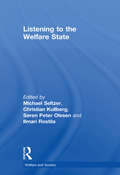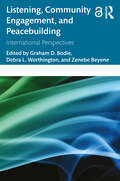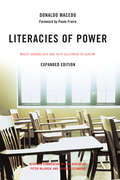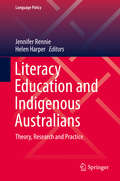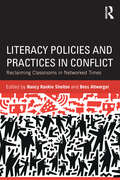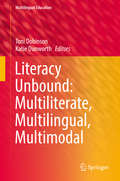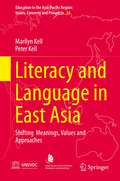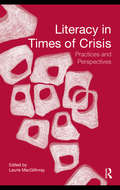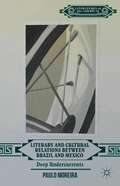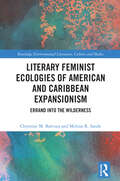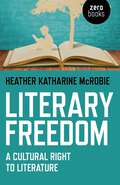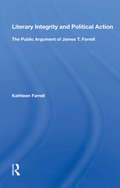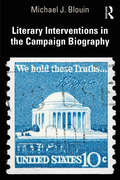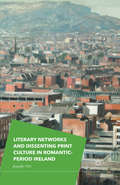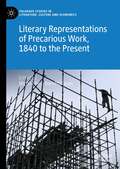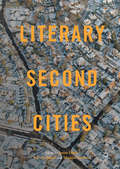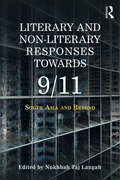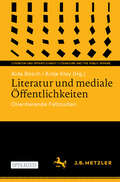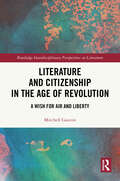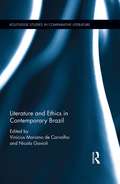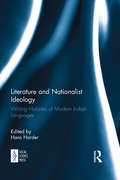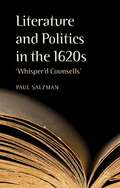- Table View
- List View
Listening to the Welfare State (Welfare and Society)
by Michael Seltzer Christian Kullberg Ilmari RostilaListening to the Welfare State presents, for the first time in English, central research findings from recent studies of the welfare systems of Denmark, Norway, Finland and Sweden. The book’s contributors are leading investigators of face-to-face encounters between welfare professionals and clients in these systems. All have collected their data through ethnographic observations as well as taped recordings of these meetings. By subjecting their data to conversation and discourse analyses, these researchers provide a richly detailed empirical picture of the various forms of talk-at-work constituting the core activity of a variety of street-level bureaucracies. Their findings provide a well-rounded body of knowledge about what happens when professionals meet persons seeking financial assistance, child protection, employment, vocational counselling, treatment, rehabilitation and related services. Essential reading for both professional and students, this book will provide a wealth of insights into and understandings of, the micro-level workings of welfare state systems.
Listening, Community Engagement, and Peacebuilding: International Perspectives
by Debra L. Worthington Graham D. Bodie Zenebe BeyeneThis book explores the role of listening in community engagement and peacebuilding efforts, bridging academic research in communication and practical applications for individual and social change. For all their differences, community engagement and peacebuilding efforts share much in common: the need to establish and agree on achievable and measurable goals, the importance of trust, and the need for conflict management, to name but a few. This book presents listening – considered as a multi-disciplinary concept related to but distinct from civility, civic participation, and other social processes – as a primary mechanism for accomplishing these tasks. Individual chapters explore these themes in an array of international contexts, examining topics such as conflict resolution, restorative justice, environmental justice, migrants and refugees, and trauma-informed peacebuilding. The book includes contemporary literature reviews and theoretical insights covering the role of listening as related to individual, social, and governmental efforts to better engage communities and build, maintain, or establish peace in an increasingly divided world. This collection provides invaluable insight to researchers, students, educators, and practitioners in intercultural and international communication, conflict management, peacebuilding, community engagement, and international studies.
Listening, Community Engagement, and Peacebuilding: International Perspectives
by Debra L. Worthington Zenebe BeyeneThis book explores the role of listening in community engagement and peacebuilding efforts, bridging academic research in communication and practical applications for individual and social change.For all their differences, community engagement and peacebuilding efforts share much in common: the need to establish and agree on achievable and measurable goals, the importance of trust, and the need for conflict management, to name but a few. This book presents listening – considered as a multi-disciplinary concept related to but distinct from civility, civic participation, and other social processes – as a primary mechanism for accomplishing these tasks. Individual chapters explore these themes in an array of international contexts, examining topics such as conflict resolution, restorative justice, environmental justice, migrants and refugees, and trauma-informed peacebuilding. The book includes contemporary literature reviews and theoretical insights covering the role of listening as related to individual, social, and governmental efforts to better engage communities and build, maintain, or establish peace in an increasingly divided world.This collection provides invaluable insight to researchers, students, educators, and practitioners in intercultural and international communication, conflict management, peacebuilding, community engagement, and international studies.Chapter 10 of this book is freely available as a downloadable Open Access PDF at http://www.taylorfrancis.com under a Creative Commons Attribution-Non Commercial-No Derivatives (CC-BY-ND) 4.0 license.
Literacies of Power: What Americans Are Not Allowed to Know With New Commentary by Shirley Steinberg, Joe Kincheloe, and Peter McLaren
by Donaldo MacedoLiteracies of Power illustrates the many ways American schools, media, and other social institutions perpetuate ignorance. In this new, expanded edition, Donaldo Macedo shows why so-called common culture literacy is a form of dominant cultural reproduction that undermines independent thought and goes against the best interests of our students. Offering a wide-ranging counterargument, Macedo shows why cultural literacy cannot be restricted to the acquisition of Western heritage values, which sustain an ideology that systematically negates the cultural experiences of many members of society-not only minorities but also anyone who is poor or disenfranchised. Macedo calls on his own experience as a Cape Verdean immigrant from West Africa who had to surmount the barriers imposed by the world's most entrenched monolingual system of higher education. His eloquence in this book is testimony to the very idea that critical thinking and good education are not and must not be culturally or linguistically bounded.A new concluding chapter by the author critically challenges the crucial role of schools in ?the manufacture of consent? for the war in Iraq and the Patriot Act, and the ?charitable racism? that is too often evident in the field of ESL. In essays new to this edition, well-known and respected educators Joe Kincheloe, Peter McLaren, and Shirley Steinberg share their insights on Macedo's message, complementing Paulo Freire's Foreword to the original edition.
Literacy Education and Indigenous Australians: Theory, Research and Practice (Language Policy #19)
by Jennifer Rennie Helen HarperThis edited volume brings together diverse perspectives on Australian literacy education for Indigenous peoples, highlighting numerous educational approaches, ideologies and aspirations. The Australian Indigenous context presents unique challenges for educators working across the continent in settings ranging from urban to remote, and with various social and language groups. Accordingly, one of the book’s main goals is to foster dialogue between researchers and practitioners working in these contexts, and who have vastly different theoretical and ideological perspectives. It offers a valuable resource for academics and teachers of Indigenous students who are interested in literacy-focused research, and complements scholarship on literacy education in comparable Indigenous settings internationally.
Literacy Policies and Practices in Conflict: Reclaiming Classrooms in Networked Times
by Nancy Rankie Shelton Bess AltwergerCurrent U.S. school reform efforts link school success, student achievement, and teacher performance to standardized tests and narrowly prescribed curricula. How do test-driven, mandated curricula in urban school systems overtly and subtly impact teachers’ efforts to provide technologically advanced, challenging classroom environments that foster literacy development for all students? How do these federal policies affect instruction at the classroom level? The premise of this book is that, in order for teachers to confront and/or counteract the pressures placed on them from these policies, it is necessary to first understand them. This book takes a close look at the tensions that exist between federal mandates and contemporary literacy needs and how those tensions impact classroom practices. Providing a clear sociopolitical overview and analysis, it combines theoretical explanations with examples from current ethnographic research. Readers are challenged to (re)consider whether meeting test performance benchmarks should be the hallmark of school success when the goal of test performance supersedes the goal of producing highly literate, productive citizens of the future.
Literacy Unbound: Multiliterate, Multilingual, Multimodal (Multilingual Education #30)
by Katie Dunworth Toni DobinsonThis volume promotes a thought-provoking discussion on contemporary issues surrounding the teaching of language and literacy based on first hand experiences and research. Drawing on the authors’ experiences as teacher educators, language and literacy teachers, and researchers on literacy issues it brings together the multiple traditions. What makes the proposed volume unique is the common theme that runs through all the chapters: the examination of the term literacy, the complexity of this term and the importance of having a wide understanding of what it is before tackling educational issues of pedagogy, assessment and student engagement. What is more, as the editors argue, it is necessary to join up the dots and explore the commonalities that form the core of the literacy spectrum.
Literacy and Language in East Asia: Shifting Meanings, Values and Approaches
by Peter Kell Marilyn KellThis book critically explores why some Asian nations are on top of the world in students' achievement tests in reading and literacy, yet governments and industry in these nations are anxious about a crisis in education. Why are governments anxious about the capabilities and skills of school and university graduates in a global economy when there is a Asian economic boom? The authors explore questions about how the Asian countries value test-based examination curriculum and its influence on the practices of teaching learning and the lives of young people in Asia. The authors describe the challenge of change for East Asian nations to develop more relevant approaches to literacy and language and more inclusive societies focussed on the needs of young people and not exam results.
Literacy in Times of Crisis: Practices and Perspectives
by Laurie MacGillivray"Fresh, provocative, timely, and important, this volume extends the field of sociocultural literacies in new directions."--Marjorie Faulstich Orellana, University of California, Los Angeles On the frontline of critical issues in education today, this book covers new ground for teachers and teacher educators for whom crisis is a daily part of their work. It explores the relationship between crisis and literacy in order to: improve educators’ ability to recognize, cope with, and avoid crisis; advance understanding of the dynamic relationship between crisis and cultural, historical, and political literacy practices; and contribute to a deeper theoretical understanding of literacy practices as they are situated in social practices. The types of crises addressed are diverse, including natural disaster, cultural and community disjuncture, homelessness, family upheaval, teen pregnancy, and disability. Along with nine empirical studies, a teacher early in her career, a veteran teacher, and teacher educators share their perspectives in commentary sections at the opening and conclusion of the book in order to provide applications to their specific fields.
Literary And Cultural Relations Between Brazil And Mexico
by Paulo MoreiraJoining a timely conversation within the field of intra-American literature, this study takes a fresh look at Latin America by locating fragments and making evident the mostly untold story of horizontal (south-south) contacts across a multilingual, multicultural continent.
Literary Criticism: A Concise Political History
by Joseph NorthSince the global turn to neoliberalism in the 1970s, movements in literary studies have been diagnostic rather than interventionist: scholars have developed techniques for analyzing culture but have retreated from attempts to transform it. For Joseph North, a genuinely interventionist criticism is a central task facing scholars on the Left today.
Literary Feminist Ecologies of American and Caribbean Expansionism: Errand into the Wilderness (Routledge Environmental Literature, Culture and Media)
by Christine M. Battista Melissa R. SandeThis book synthesizes ecofeminist theory, American studies, and postcolonial theory to interrogate what New Americanist William V. Spanos articulates as the "errand into the wilderness": the ethic of Puritanical expansionism at the heart of the U.S. empire that moved westward under Manifest Destiny to colonize Native Americans, non-whites, women, and the land. The project explores how the legacy of the errand has been articulated by women writers, from the slave narrative to contemporary fiction. Uniting texts across geographical and temporal boundaries, the book constructs a theoretical approach for reading and understanding how women authors craft counter-narratives at the intersection of metaphorical and literal landscapes of colonization. It focuses on literature from the United States and the Caribbean, including the slave narratives by Sojourner Truth, Harriet E. Wilson, and Harriet Jacobs, and contemporary work by Toni Morrison, Maryse Condé, Edwidge Danticat, and Native American writer Linda Hogan. It charts the contrast between America’s earliest idyllic visions and the subsequent reality: an era of unprecedented violence against women of color and the environment. This study of many canonical writers presents an important and illuminating analysis of American mythologies that continue to impact the cultural landscape today. It will be a significant discussion text for students, scholars, and researchers in environmental humanities, ecofeminism, and postcolonial studies.
Literary Freedom: A Cultural Right to Literature
by Heather Katherine McRobieLiterary Freedom: a Cultural Right to Literature is a non-fiction study of literary freedom from a political-philosophical perspective. It adds an original perspective on the issue of literary freedom as it synthesizes debates from human rights as well as providing a new way of addressing the question "How do we mitigate against the harm caused by hate speech?" by applying Amartya Sen's capability approach to this question.
Literary Integrity And Political Action: The Public Argument Of James T. Farrell
by Kathleen FarrellThis book is about the story of James T. Farrell's role in the debate over the relationship between literature and politics during the 1930s. It is useful for American literary and intellectual history, American Left, and rhetoric and communication scholars interested in political controversy. .
Literary Interventions in the Campaign Biography
by Michael J. BlouinLiterary Interventions in the Campaign Biography considers campaign biographies written by major authors including Nathaniel Hawthorne, William Dean Howells, Lew Wallace, Jacob Riis, and Rose Wilder Lane. Whereas a number of cultural historians have previously considered campaign biographies to be marginal or isolated from the fictional output of these figures, this volume revisits the biographies in order to understand better how they inform, and are informed by, seismic shifts in the literary landscape. The book illuminates the intersection of American literature and politics while charting how the Presidency has developed in the public imagination. In so doing, it poses questions of increasing significance about how we understand the office as well as its occupants today.
Literary Networks and Dissenting Print Culture in Romantic-Period Ireland
by Jennifer OrrLiterary Networks and Dissenting Irish Print Culture examines the origins of Irish labouring-class poetry produced in the liminal space of revolutionary Ulster (1790-1815), where religious dissent fostered a unique and distinctive cultural identity.
Literary Representations of Precarious Work, 1840 to the Present (Palgrave Studies in Literature, Culture and Economics)
by Michiel Rys Bart PhilipsenLiterary Representations of Precarious Work, 1840 to the Present sheds new light on literary representations of precarious labor from 1840 until the present. With contributions by experts in American, British, French, German and Swedish culture, this book examines how literature has shaped the understanding of socio-economic precarity, a concept that is mostly used to describe living and working conditions in our contemporary neoliberal and platform economy. This volume shows that authors tried to develop new poetic tools and literary techniques to translate the experience of social regression and insecurity to readers. While some authors critically engage with normative models of work by zooming in on the physical and affective backlash of being a precarious worker, others even find inspiration in their own situations as writers trying to survive. Furthermore, this volume shows that precarity is not an exclusively contemporary phenomenon and that literature has always been a central medium to (critically) register forms of social insecurity. By retrieving parts of that archive, this volume paves the way to a historically nuanced view on contemporary regimes of precarious work.
Literary Second Cities
by Lieven Ameel Jason Finch Markku SalmelaThis book brings together geographers and literary scholars in a series of engagements near the boundaries of their disciplines. In urban studies, disproportionate attention has been given to a small set of privileged 'first' cities. This volume problematizes the dominance of such alpha cities, offering a wide perspective on 'second cities' and their literature. The volume is divided into three themed sections. 'In the Shadow of the Alpha City' problematizes the image of cities defined by their function and size, bringing out the contradictions and contestations inherent in cultural productions of second cities, including Birmingham and Bristol in the UK, Las Vegas in the USA, and Tartu in Estonia. 'Frontier Second Cities' pays attention to the multiple and trans-national pasts of second cities which occupy border zones, with a focus on Narva, in Estonia, and Turkish/Kurdish Diyarbakir. The final section, 'The Diffuse Second City', examines networks the diffuse secondary city made up of interlinked small cities, suburban sprawl and urban overspill, with literary case studies from Italy, Sweden, and Finland.
Literary and Non-literary Responses Towards 9/11: South Asia and Beyond
by Nukhbah Taj LangahThis book presents a range of analytical responses towards 9/11 through a critical review of literary, non-literary and cultural representations. The contributors examine the ways in which this event has shaped and complicated the relationship between various national and religious identities in contemporary world history. Unlike earlier studies on the topic, this work reconciles both eclectic and pragmatic approaches by analyzing the stereotypes of nationhood and identities while also questioning theoretical concepts in the context of the latest political developments. The chapters focus on discourses, themes, imagery and symbolism from across fiction and non-fiction, films, art, music, and political, literary and artistic movements. The volume addresses complexities arising within different local contexts (e.g., Hunza and state development); surveys broader frameworks in South Asia (representations of Muslims in Bollywood films); and gauges international impact (U.S. drone attacks in Islamic countries; treatment meted out to Muslims in Europe). It also connects these with relevant theories (e.g., Orientalism) and policy perspectives (e.g., Patriotic Act). The authors further discuss the consequences for minorities and marginalization, cultural relativism vs. ethnocentrism, the clash of civilizations, fundamentalism, Islamization and post-9/11 ‘Islamophobia’. This book will be useful to scholars and researchers of South Asian literature, Islamic studies, literary criticism, political sociology, anthropology and cultural studies, those in the media and the general reader.
Literatur und mediale Öffentlichkeiten: Orientierende Fallstudien (Literatur und Öffentlichkeit / Literature and the Public Sphere)
by Aida Bosch Antje KleyDas vorliegende Open-Access-Buch geht der Frage nach, welchen Ort und welche Rolle zeitgenössische Literaturen in mediatisierten, kommerziell umkämpften und transnational vernetzten Öffentlichkeiten einnehmen. Die Fallstudien in diesem Band adressieren den digitalen Strukturwandel der Öffentlichkeit, die mediale Differenzierung und Pluralisierung öffentlicher Räume und damit verbundene ästhetische, ethische, institutionelle und politische Herausforderungen an die Produktion und Rezeption von Literatur. Anhand aktueller Beispiele werden mediale Vernetzungen von Literatur sowie die ästhetischen Möglichkeiten und kulturellen Funktionen verschiedener Medien im Vergleich und in ihrem Zusammenspiel erkundet. Auch die Bedingungen des Literaturbetriebs werden zum Thema: Regulierungen der Teil-Öffentlichkeiten, die durch technische, organisatorische oder politische Entscheidungen vorgenommen werden und die im Hintergrund des Mediengeschehens die Produktion jedes veröffentlichten Textes oder Bildes bestimmen. Gefragt wird aber vor allem nach der Rolle der Literatur für die Reflexion gesellschaftlich-politischer Fragen, zum Beispiel hinsichtlich der Bewertung unterschiedlicher Diskursformate, der Aufarbeitung historischen Unrechts sowie der Neubestimmung und Neugestaltung gesellschaftlicher Strukturen. Das Interesse des Bandes insgesamt gilt den Rollen literarischer Diskurse und des vielgestaltigen Literaturbetriebs für deliberative demokratische Prozesse.
Literature The People Love
by Krista Van Fleit HangExamining the production of 'people's literature' in China, this study provides a new interpretive framework with which to understand socialist literature and presents a sympathetic understanding of culture from a period in China's history in which people's lives were greatly and obviously affected by political events.
Literature and Citizenship in the Age of Revolution: A Wish for Air and Liberty (Routledge Interdisciplinary Perspectives on Literature)
by Mitchell GauvinCitizenship is at the forefront of popular imagination as political movements and state governments around the world traffic in anti-immigrant rhetoric and call for increased policing of borders. Literature and Citizenship in the Age of Revolution: A Wish for Air and Liberty looks back to a critical historical juncture in the development of citizenship to uncover how literature contoured and contested imaginings of citizenship. While territory and the nation-state often frame our understanding of citizenship, this book focuses on how non-citizens, foreigners, and strangers have long been central to citizenship’s coherence. Rather than rootedness, literary texts exposed the circulations of persons, ideas, and affections at the heart of citizenship. This book brings together an unlikely combination of writers—Olaudah Equiano, Jane Austen, Mary Shelley, and Herman Melville—to show how literature in the Age of Revolution exposed contradictions in notions of liberty and slavery that impacted how citizenship was conceived and practiced.
Literature and Ethics in Contemporary Brazil (Routledge Studies in Comparative Literature)
by Vinicius Mariano De Carvalho Nicola GavioliWhen Brazil was honored at the Frankfurt Book Fair in 2013, the Brazilian author Luiz Ruffato opened the event with a provocative speech, claiming that literature, through its pervasive depiction and discussion of ‘otherness,’ has the potential to provoke ethical transformation. This book uses Ruffato’s speech as a starting point for the discussion of contemporary Brazilian literature that stands in contrast to the repetition of social and cultural clichés. By illuminating the relevance of humanities and literature as a catalyst for rethinking Brazil, the book offers a resistance to the official discourses that have worked for so long to conceal social tensions, injustices, and secular inequities in Brazilian society. In doing so, it situates Brazilian literature away from the exotic and peripheral spectrum, and closer to a universal and more relevant ethical discussion for readers from all parts of the world. The volume brings together fresh contributions on both canonical contemporary authors such as Graciliano Ramos, Rubem Fonseca, and Dalton Trevisan, and traditionally silenced writing subjects such as Afro-Brazilian female authors. Essays deal with specific contemporary literary and social issues while engaging with historically constitutive phenomena in Brazil, including authoritarianism, violence, and the systematic violation of human rights. The exploration of diverse literary genres -- from novels to graphic novels, from poetry to crônicas -- and engagement with postcolonial studies, gender studies, queer studies, cultural studies, Brazilian studies, South American literature, and world literature carves new space for the emergence of an original Brazilian thought.
Literature and Nationalist Ideology: Writing Histories of Modern Indian Languages (Ssp Ser.)
by Hans HarderWriting histories of literature means making selections, passing value judgments, and incorporating or rejecting foregoing traditions. The book argues that in many parts of India, literary histories play an important role in creating a cultural ethos. They are closely linked with nationalism in general and various regional ‘sub-nationalisms’ in particular. The contributors to this volume look at a great variety of aspects of the historiography of modern regional languages of India. Please note: Taylor & Francis does not sell or distribute the Hardback in India, Pakistan, Nepal, Bhutan, Bangladesh and Sri Lanka
Literature and Politics in the 1620s
by Paul SalzmanThis exciting study of the literature of the 1620s argues that during the decade a huge range of writing and performance reflected the growing hunger of readers and audiences for political information and commentary mediated through literature. The comparatively neglected decade is reshaped by this book, which argues that literature was inextricably linked to politics, whether oppositional or authoritarian. A wide range of texts are analyzed, from Shakespeare's First Folio to Middleton's A Game At Chess, from romances and poetry to sermons, tracts and newsbooks. Salzman argues that the flow and counterflow of these texts was part of a cultivated practice of reading and writing, that politicized every moment as a contest of ideas. This is literary history at its most innovative and informative. Additional materials for Literature and Politics in the 1620s can be found here: http: //www. latrobe. edu. au/humanities/research/specialisations/literary-studies
